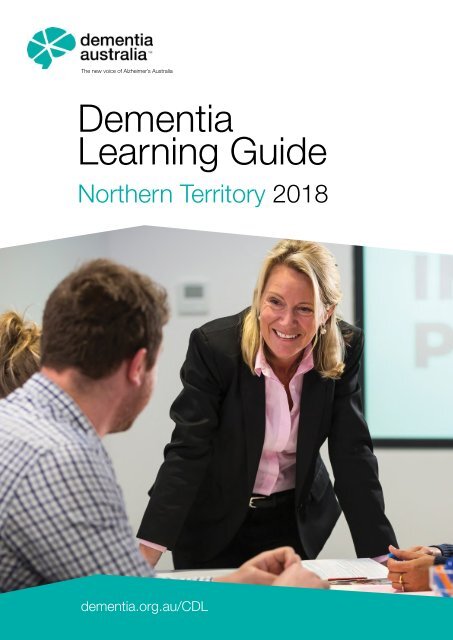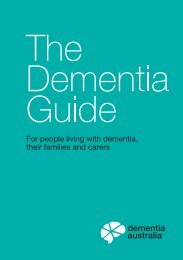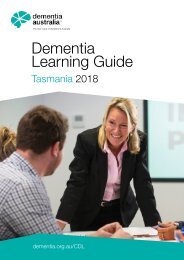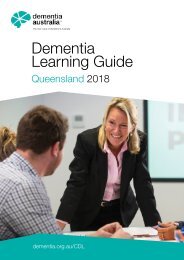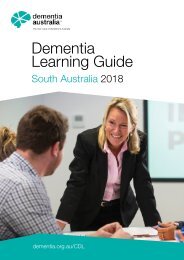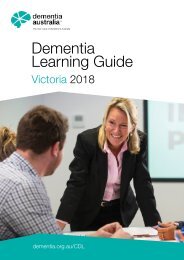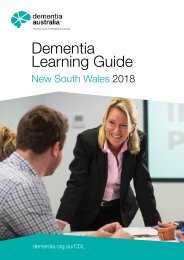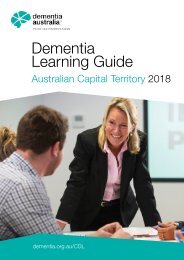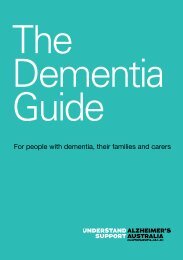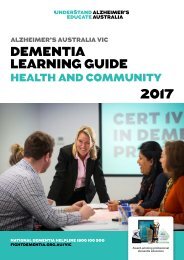DementiaLearningGuide-NT
You also want an ePaper? Increase the reach of your titles
YUMPU automatically turns print PDFs into web optimized ePapers that Google loves.
Dementia<br />
Learning Guide<br />
Northern Territory 2018<br />
dementia.org.au/CDL
Dementia Australia is the leading provider<br />
of dementia education in Australia. Our<br />
highly skilled team has extensive experience<br />
in a wide range of areas, facilitating<br />
learning experiences which touch, move<br />
and inspire participants to transform their<br />
practice. Informed by current research and<br />
contemporary practice, our comprehensive<br />
suite of education forms part of an<br />
integrated learning pathway incorporating<br />
both accredited and non-accredited<br />
courses delivered face to face, as well as<br />
online.<br />
For subscribers<br />
Register as a paid subscriber to enable<br />
open access to:<br />
To find out more<br />
• all online courses<br />
• library resources<br />
• a range of print materials, e-books,<br />
online resources and library staff<br />
support<br />
• our video channel<br />
• recommended podcasts and<br />
conversations<br />
• various help sheets, reports and<br />
dementia research information<br />
email<br />
call<br />
visit<br />
klem.hedenig@dementia.org.au<br />
08 7979 0076<br />
dementia.org.au/CDL<br />
RTO Code: 2512<br />
Stay connected<br />
Dementia Australia<br />
Dementia Aus<br />
Dementia_Australia<br />
Dementia Australia<br />
Dementia Australia<br />
Some programs are funded by the Australian Government or<br />
jointly funded by the Northern Territory and Australian<br />
Governments through the Home and Community Care program.<br />
DISCLAIMER: The information in this publication was current at<br />
the publication date, November 2017.<br />
Please check our website dementia.org.au/CDL for current<br />
information.<br />
© Dementia Australia 2017<br />
ABN 14 671 840 186<br />
1
Contents<br />
Centre for Dementia Learning<br />
Transforming dementia practice 4<br />
Accredited training<br />
Dementia essentials 5<br />
Foundation learning<br />
Understanding dementia 6<br />
Supporting successful communication 6<br />
How to register<br />
Bookings are essential. Places are<br />
limited and subject to the terms and<br />
conditions within this document.<br />
For details of cost, venue, dates and<br />
times, please go to:<br />
dementia.org.au/CDL<br />
For bookings, contact us on<br />
08 7979 0076 or<br />
klem.hedenig@dementia.org.au<br />
Applying a problem solving<br />
approach to behaviour<br />
8<br />
Achieving purposeful engagement 8<br />
Learning through virtual reality<br />
Enabling Edie TM 9<br />
Online learning<br />
What is dementia? (free) 11<br />
Communicating in a person-centred way 11<br />
How person-centred is your practice 11<br />
A problem solving approach to behaviours 11<br />
Understanding younger<br />
onset dementia (free)<br />
11<br />
Dementia and pain in residential care 11<br />
Consultancy 12<br />
The Virtual Forest TM 13<br />
2
Our facilitators<br />
Our highly-skilled facilitation team are<br />
experienced in health, working in the<br />
community and providing direct support to<br />
people living with dementia and their carers.<br />
All facilitators are qualified in workplace<br />
training and assessment (Cert IV<br />
TAE40110), Diplomas or higher level<br />
qualifications in adult education.<br />
The contemporary industry skills of our<br />
facilitators enable them to create positive<br />
and engaging learning experiences.<br />
They have continual access to experts<br />
in dementia practice and research,<br />
and undertake ongoing professional<br />
development.<br />
For your workplace<br />
Achieve your organisational dementia<br />
learning objectives by taking advantage<br />
of our education programs, conveniently<br />
delivered at your workplace. Our extensive<br />
range of programs are designed to ensure<br />
learning extends well beyond the workshop<br />
and enhances practice improvement. Our<br />
aim is to support your organisation to<br />
deliver quality and sustainable dementia<br />
practice.<br />
Discuss your own unique learning<br />
requirements with us and together we will<br />
determine the most appropriate program<br />
that best meets the needs of your staff.<br />
Our experienced facilitators will build the<br />
skills and knowledge of your team, inspiring<br />
them to provide best practice dementia<br />
support. Contact us today to discuss the<br />
opportunities available to your organisation.<br />
Most workshops listed in this guide<br />
can be delivered at your workplace.<br />
Contact us on 08 7979 0076 or<br />
klem.hedenig@dementia.org.au for<br />
further details.<br />
Continuing<br />
Professional<br />
Development<br />
Our learning programs are suitable for a<br />
wide range of qualified health professionals<br />
and dementia support staff.<br />
Earning Continuing Professional<br />
Development (CPD) points has never been<br />
easier with our comprehensive suite of<br />
programs that form part of an integrated<br />
learning pathway.<br />
Professional development<br />
certificates<br />
We issue Certificates of Attendance with<br />
date and duration information to fulfil<br />
your CPD requirements. Certificates of<br />
Attainment are provided for successfully<br />
completing an accredited course.<br />
3
Transforming<br />
dementia practice<br />
This Dementia Learning Guide<br />
provides an overview of the range<br />
of learning opportunities available<br />
through Dementia Australia for 2018.<br />
This includes a suite of nationally<br />
consistent courses available through<br />
the Centre for Dementia Learning.<br />
Dementia Australia has over thirty<br />
years’ experience in promoting high<br />
quality dementia practice. The Centre<br />
for Dementia Learning will provide<br />
a comprehensive suite of evidence<br />
based learning and consultancy<br />
services to help improve the quality of<br />
care and quality of life experienced by<br />
people living with dementia.<br />
Maree McCabe<br />
Chief Executive Officer<br />
Dementia Australia<br />
4
National Dementia Education<br />
Accredited training<br />
Dementia essentials<br />
CHCAGE005 Provide support to people living with dementia<br />
This nationally accredited course is designed to assist workers supporting people living<br />
with dementia. The fully funded program provides fundamental professional development<br />
for existing workers across the sector utilising both theory and practical application of skills<br />
and knowledge during the assessment process. Strategies are explored to assist with<br />
effective communication, planning and developing meaningful activities and understanding<br />
the causes of changed behaviour in people living with dementia. This is a Dementia Training<br />
Australia (DTA) course, which is funded by the Australian Government and delivered by<br />
Dementia Australia.<br />
3 days of 6 hour workshops<br />
Suitable for all staff providing<br />
support to people living with<br />
dementia and their carers<br />
5 National Courses and Workshops
Foundation learning<br />
COMING<br />
SOON<br />
The following three hour workshops are provided by the Centre for Dementia Learning and<br />
facilitated by our expert team. Each workshop is underpinned by a contemporary approach<br />
to dementia support and draws on the most popular learning resources from across<br />
Australia. Workshops can be delivered onsite and contribute towards CPD points.<br />
Understanding<br />
dementia<br />
This workshop provides an overview<br />
of dementia as a major neurocognitive<br />
disorder, including signs and symptoms,<br />
causes, and an understanding of how<br />
dementia affects the brain and behaviour.<br />
You will be encouraged to reflect on your<br />
practice and how this knowledge translates<br />
into person-centred support for people<br />
living with dementia.<br />
Learning outcomes<br />
At the end of this session you will<br />
understand:<br />
• the nature of dementia, including<br />
prevalence, risks, types of dementia<br />
and signs of dementia<br />
• the impact of dementia<br />
• a person-centred approach to dementia<br />
support<br />
• the resources and services available<br />
3 hours<br />
Suitable for all staff providing<br />
support to people living with<br />
dementia and their carers<br />
Supporting<br />
successful<br />
communication<br />
This workshop explores the difficulties that<br />
people living with dementia can experience<br />
in communication and the impact this has<br />
as the condition progresses. You will learn<br />
to identify barriers to communication and<br />
develop strategies to support successful<br />
communication for the person living<br />
with dementia and those in the support<br />
relationship.<br />
Learning outcomes<br />
At the end of this session you will<br />
understand:<br />
• how dementia can impact on a person’s<br />
ability to communicate<br />
• how to identify barriers to<br />
communication<br />
• how to develop strategies to support<br />
successful communication for the<br />
person living with dementia<br />
3 hours<br />
Suitable for all staff providing<br />
support to people living with<br />
dementia and their carers<br />
National Dementia Education 6
7 National Courses and Workshops
COMING<br />
SOON<br />
Applying a problem<br />
solving approach to<br />
behaviour<br />
In this workshop you will gain an<br />
understanding of changed behaviours<br />
related to dementia, their impact and<br />
contributing factors. You will learn how to<br />
apply a systematic approach to problem<br />
solving changed behaviours and provide<br />
positive support strategies for people living<br />
with dementia.<br />
Learning outcomes<br />
At the end of this session you will<br />
understand:<br />
• changed behaviours related to<br />
dementia<br />
• the impact of changed behaviours<br />
• the application of a systematic<br />
approach to problem solving changed<br />
behaviours<br />
• how to identify the contributing factors<br />
to behaviour change<br />
• how to support strategies to reduce the<br />
risk of behaviours<br />
3 hours<br />
Suitable for all staff providing<br />
support to people living with<br />
dementia and their carers<br />
Achieving<br />
purposeful<br />
engagement<br />
This workshop provides an understanding<br />
of the importance of meaningful and<br />
purposeful engagement for people<br />
living with dementia. You will focus on<br />
understanding the person’s individual<br />
needs, strengths and abilities and the<br />
impact of the environment in planning and<br />
supporting engaging activities.<br />
Learning outcomes<br />
On completion of this workshop you will be<br />
able to:<br />
• describe the impact of dementia<br />
• understand the importance of<br />
engagement for people living with<br />
dementia<br />
• understand the underpinning principles<br />
of engagement<br />
• understand the individual needs of<br />
people living with dementia with a focus<br />
on their unique strengths and abilities<br />
3 hours<br />
Suitable for all staff providing<br />
support to people living with<br />
dementia and their carers<br />
National Dementia Education 8
Learning through<br />
virtual reality<br />
COMING<br />
SOON<br />
Enabling EDIE <br />
Enabling EDIE TM uses virtual reality technology to enhance your knowledge of the impact<br />
of dementia and to develop a support plan that enables Edie and his wife to live more<br />
confidently with dementia. The aim of this workshop is to better understand dementia from<br />
the perspective of the consumer through an Educational Dementia Immersive Experience<br />
(Enabling EDIE TM ). This three hour workshop introduces a ‘reablement’ approach, focusing<br />
positively on what people can do, given appropriate support, and on the possibilities for living<br />
well with dementia.<br />
Learning outcomes<br />
At the end of this session you will<br />
understand:<br />
• a consumer’s perspective of dementia<br />
• how to identify support needs in<br />
partnership with the client and their<br />
carer<br />
• how to develop a dementia support<br />
plan that focuses on enabling a person<br />
living with dementia<br />
3 hours<br />
Suitable for all staff providing<br />
support to people living with<br />
dementia and their carers<br />
9 National Courses and Workshops<br />
8
Online learning<br />
For individuals<br />
Our interactive online learning courses<br />
provide you with contemporary, evidence<br />
based dementia learning. Each course<br />
encourages you to reflect on your<br />
practice and identify areas for individual<br />
or organisational improvement. You can<br />
access our range of free courses or<br />
purchase individual courses of interest that<br />
can be completed in your own time and at<br />
your own pace.<br />
For organisations<br />
The Dementia Practice Improvement (DPI)<br />
Series has been specially developed to<br />
allow health care professionals to develop<br />
their own practice improvement plan for<br />
future implementation in their workplace.<br />
The series covers a range of topics that<br />
will encourage your staff to reflect on their<br />
own practice, and will help to improve their<br />
dementia knowledge and practice.<br />
9<br />
National Dementia Education 10
Our online<br />
courses include:<br />
What is dementia? (Free)<br />
Dementia is a condition health professionals<br />
will encounter in a range of care settings.<br />
This 3-part course is designed to provide<br />
you with an introduction to dementia,<br />
diagnosis, treatment and support strategies<br />
for both the person living with dementia and<br />
their carer.<br />
Communicating in a<br />
person-centred way<br />
Good communication skills are essential<br />
in providing support to people living with<br />
dementia and their carer. In this 3-part<br />
course you will explore communication<br />
for people living with dementia and<br />
the influence of the people within the<br />
support relationship to promote positive<br />
communication.<br />
How person-centred<br />
is your practice<br />
Person-centred practice is an approach<br />
that has evolved over time to become an<br />
expectation for service delivery. Although<br />
the term person-centred has become<br />
common language, do we truly provide<br />
person-centred support? This 5-part course<br />
explores the elements of person-centred<br />
practice through a person-centred practice<br />
framework. We will encourage you to<br />
reflect on your current practice and provide<br />
strategies to improve and enhance your<br />
practice.<br />
A problem solving approach<br />
to behaviours<br />
Many people living with dementia will<br />
experience behavioural changes associated<br />
with dementia. These changes can include<br />
aggression, agitation and delusions.<br />
Behaviour change can cause distress and<br />
impact the well-being of the person living<br />
with dementia as well as those supporting<br />
them. There are many reasons as to<br />
why these behaviours occur. This 3-part<br />
course is designed to provide you with<br />
an understanding of behaviours through<br />
a problem solving approach and explore<br />
effective strategies to help prevent or<br />
minimise the impact of behaviour.<br />
Understanding younger onset<br />
dementia (Free)<br />
Although the risk of developing dementia<br />
increases with age and most people living<br />
with dementia are over the age of 65,<br />
younger people can also be diagnosed. The<br />
term ‘younger onset dementia’ is used to<br />
describe any form of dementia in a person<br />
under 65 years of age. This 3-part course<br />
aims to increase your awareness of the<br />
unique and often complex issues involved<br />
when a young person is diagnosed with<br />
dementia, the impact it has on their life and<br />
how their care partners are best supported.<br />
This module has been funded by NSW<br />
Family and Community Services.<br />
Dementia and pain in<br />
residential care<br />
This is the first in a number of exciting new<br />
short courses being released in 2018. This<br />
course will take approximately 20 minutes<br />
to complete and will provide you with links<br />
to further resources and a certificate of<br />
completion. It aims to raise your awareness<br />
of the prevalence of pain in residential<br />
aged care, helps you identify some of the<br />
common causes of pain and assists you<br />
in and managing pain for people living with<br />
dementia.<br />
dementia.org.au/CDL<br />
11<br />
10
Consultancy<br />
The Centre for Dementia Learning provides a flexible range of consultancy support uniquely<br />
tailored to assist organisations in achieving their specific goals.<br />
Our team works with executives, managers, staff, consumers and families to implement<br />
evidence based and sustainable practice improvement.<br />
Our approach<br />
Our consultancy framework represents<br />
opportunities for change and growth that<br />
encourage engagement across the whole<br />
organisation. The framework includes:<br />
• building sound evidence to support<br />
practice improvement<br />
• exploring and developing a unique<br />
model of care<br />
• a focus on sustainability<br />
• developing staff knowledge and skills to<br />
support the engagement of people with<br />
dementia in purposeful and enjoyable<br />
activities<br />
“The consultancy changed the way we<br />
thought about dementia”<br />
Participant<br />
The principles which underpin our approach<br />
are that:<br />
• people living with dementia should<br />
enjoy purposeful lives that reflect their<br />
abilities, interests and choices<br />
• families should feel respected and<br />
welcome as valued members of the<br />
community of care<br />
• staff should experience rewarding work<br />
and inclusive teamwork<br />
• the organisation should implement<br />
systems and practices that support<br />
meaningful relationships, a homely<br />
community and a competitive business<br />
advantage<br />
National Dementia Education 12
TM<br />
The Virtual Forest TM , co-designed with<br />
Lifeview Aged Care, is a sensory application<br />
designed to improve the quality of life of<br />
people living with dementia through the<br />
use of video game technology. Residents<br />
are seated in front of a beautiful projected<br />
garden image and, through the use of<br />
kinetic technology and gentle movement,<br />
can guide and change the scenery;<br />
interacting with the fish, mother duck and<br />
her ducklings, butterflies and boat. The<br />
Virtual Forest TM is designed to place the<br />
person living with dementia in control of<br />
their environment and experience.<br />
The Virtual Forest TM is supported by an<br />
e-learning program that guides residential<br />
aged care staff on how to optimise the<br />
experience for the resident. The program<br />
explores dementia and the impact on<br />
communication and how The Virtual<br />
Forest TM can create a unique opportunity for<br />
meaningful, client focused engagement.<br />
The Virtual Forest TM is now available for purchase by contacting CDL@dementia.org.au<br />
13
National Dementia Education 14
To find out more<br />
email<br />
call<br />
visit<br />
klem.hedenig@dementia.org.au<br />
08 7979 0076<br />
dementia.org.au/CDL<br />
The new voice of Alzheimer’s Australia<br />
For language assistance<br />
131 450<br />
Dementia Australia is supported by financial assistance<br />
from the community, the Australian Government and State<br />
Governments<br />
National Dementia Helpline is funded by the Australian<br />
Government<br />
©2017 ABN 79 625 582 771


